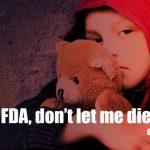
On April 25, two representatives from the Force traveled to Washington, DC, to attend the AdCom Conference of the Food & Drug Administration (FDA), which focused on the approval of new treatments for DMD.
The following is what they wanted to communicate to the DMD community on their return to the US capital.
“FDA, please don’t let me die early …”
This was the amazing conclusion of the advocacy speech by Billy Ellsworth, 15, who stood – in every sense of the term – in front of the United States Food & Drug Administration (FDA) members who were present the event. At 15, he is still able to stand on two legs, which quite unusual given the course Duchenne muscular dystrophy (DMD) normally takes: this is because, for several years, Billy has benefited from Eteplirsen treatments.
Out of the corner of my eye, I gaze at Marie-Catherine, my friend, and partner in La Force Foundation, and I wonder how she manages to hold out, listening to all those testimonials presented by children currently living with more advanced stages of dystrophy muscular dystrophy. Last year, we managed to obtain special access to another treatment, Ataluren (Translarna) for her son Anakin; efforts have also benefited four other families in Canada; but now, just as with Eteplirsen, this medication is under threat of not being approved and may be lost, despite having shown immediate results (after 3 months) in Anakin’s case.
At the big Monday conference, it was as if the Eteplirsen treatment was being brought before the “FDA court”. In the morning, Sarepta, the pharmaceutical company, was first filed its evidence, followed by the FDA, which made its argument using graphics and PowerPoint presentations galore; this was followed in the afternoon by 51 testimonies on the treatment of children, families, and researchers, who made their case in front of the committee that will subsequently be making recommendations to the FDA. The FDA will then debate the matter and decide whether or not to approve the treatment.
DOMINO EFFECT
In the world of rare diseases, it’s virtually impossible to have access to the same kind of data as for diseases with a larger pool of patients. In the case of DMD, each child develops the disease at his own pace and each case is unique, so it’s very difficult to measure the impact of treatment on a small group of patients. Each treatment in development can only apply to approximately 13% of a given population (in the United States, for example, this represents 15 000 afflicted children). When it comes to rare diseases, approval standards must be more flexible and progressive, otherwise, it’s virtually impossible to develop a treatment and hope to get approval. Some scientists believe that a combination of treatments could well constitute a cure, but if no treatment is approved, it will discourage other biotechnology companies from developing other treatments, since these two can only handle one mutation and are bound to meet the same type of obstacle.
You may be asking yourself what are the consequences of a positive or negative decision by the FDA for Canadians? You won’t be surprised to hear that, historically, Health Canada’s decisions have been influenced by those of our neighbors to the South.
During the 11-hour conference, I often watched my friend Marie-Catherine with an anxious eye, knowing that it’s extremely difficult for her to hear these testimonials and having to face a reality which is not yet hers since her son is only 8 years old.
I look at all these people around the room – many of which are directing a foundation in addition to caring for their child (or children: some have three!…) –, and all I see is courage. Some of them, like Pat Furlong, founder of PPMD, is part of the first generation – their children died of Duchenne muscular dystrophy – but they continue the fight.
Personally, I can tell you that this long day forever changed my perception of life’s problems. I feel sad for these parents, but I know will never really understand the pain they endure every day.
Read more
Forbes Market – Change.org (petition) – Boston Business Journal – CBS News
Boston Globe – Austin Leclaire – PPMD – FDA AD-COMM – Health Canada PAS



